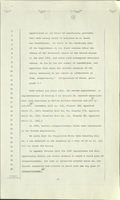Search the Special Collections and Archives Portal
Search Results
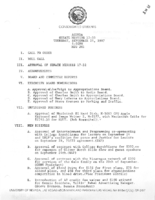
Meeting minutes for Consolidated Student Senate University of Nevada, Las Vegas, September 24, 1987
Date
Archival Collection
Description
Text

Meeting minutes for Consolidated Student Senate University of Nevada, Las Vegas, October 4, 1999
Date
Archival Collection
Description
Text
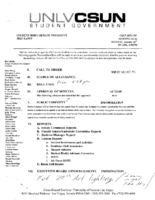
Meeting minutes for Consolidated Student Senate, University of Nevada, Las Vegas, January 28, 2008
Date
Archival Collection
Description
Text
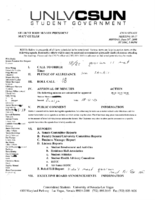
Meeting minutes for Consolidated Student Senate, University of Nevada, Las Vegas, June 16, 2008
Date
Archival Collection
Description
Text
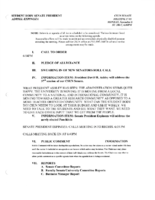
Meeting minutes for Consolidated Student Senate, University of Nevada, Las Vegas, November 06, 2006
Date
Archival Collection
Description
Text
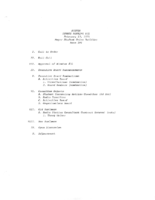
Meeting minutes for Consolidated Student Senate, University of Nevada, Las Vegas, February 13, 1979
Date
Archival Collection
Description
Text

Meeting minutes for Consolidated Student Senate, University of Nevada, Las Vegas, November 15, 1973
Date
Archival Collection
Description
Text
Barbara Raben Collection on the Las Vegas Jewish Community
Identifier
Abstract
The Barbara Raben Collection on the Las Vegas Jewish Community (1976-2018) is comprised of materials collected by Barbara Raben that document her personal life and her involvement with the Las Vegas, Nevada Jewish community, specifically the Hadassah Southern Nevada Chapter and the Jewish Family Service Agency (JFSA) of Clark County, Nevada. Hadassah and JFSA records consist of photographs and programs from events held by the organizations. Materials also document Raben's business, The Candy Factory, and her connections to the Florence Melton School of Adult Jewish Learning.
Archival Collection

University of Nevada, Las Vegas (UNLV) 35th commencement program
Date
Archival Collection
Description
Commencement program from University of Nevada, Las Vegas Commencement Programs and Graduation Lists (UA-00115).
Text

